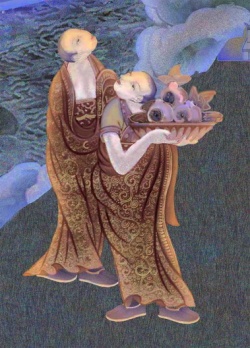Buddhist Epistemology and Darwin's Theory of Evolution
The goal of Buddhism is to help alleviate human suffering. The Second Noble Truth states that "craving" is the root cause of "suffering." The Fourth Noble Truth states that the practice of Shila (Ethics), Samadhi(Effort), and Pragya (Wisdom) helps us eliminate craving and,thus,eliminate suffering.
The Wisdom aspect of the Buddhist Path deals with how we "see" or process information. Buddhist Masters-for over 2000 years-studied and debated the epistemological aspect of life. Their sophisticated technique of ascertaining reality matches the recent developments in Quantum Physics. They found that all worldly processes, objects,and events have two modes of existence: the conventional mode and the ultimate mode. The conventional mode is the way of seeing when we filter information through the lens of our concepts and biases. According to Buddhism, we suffer because we often fail to see the "ultimate" mode of existence of what is happening around us.
That brings us to the question: why do we have to be like this? Why did we develop the "filters" of concepts and biases.
Charles Darwin has provided an answer to the question above in his theory of evolution. I was reading the book Ever Since Darwin: Reflections in Natural History by one of my favorite authors Stephen Jay Gould. Stephen Jay Gould writes,"Darwin maintained that evolution has no direction: it does not lead inevitably to higher things. Organism become better adapted to their local environments, and this is all. The "degeneracy" of a parasite is as perfect as the gait of a gazelle."
The above counters a prevailing misunderstanding about the theory of evolution that it always takes us to a more refined state.
Nature helped us develop numerous "biases" to improve the chances of our survival. Our instinctive fear of snakes(http:/www.sciencedaily.comreleases/2008/02/080227121840.htm) is one such example. When we come across something that looks like a snake, we are afraid and we try to get away. When we are afraid, we do not stop to investigate if it is a rope in the dark or is it actually a snake. Our survival depended upon such a "bias" because the world was full of poisonous snakes.
Fear of strangers that often devolves into racism is another example of nature's evolution. A few thousand years ago,if we came across something that we had never seen before, we had to be afraid. That "strange" thing could kill us.
We are so deep in the world of concepts and biases that we seldom notice them. They cloud our judgment and actions nevertheless.
As Stephen Jay Gould has written in his book,"It(evolution) does not lead inevitably to higher things." The evolutionary biases which helped us survive in the past, may not be needed anymore; it appears that the process of evolution is not agile enough to adapt to the new reality of the world.
One import of the above is, we share only part of the "blame" for carrying all the biases and concepts. Another is, the struggle to get rid of the biases and concepts is going for at least 2500 years! Since the time of the Buddha in fact.
The First Noble Truth states that "Samsara,or the world, is in a pervasive state of suffering: suffering of sickness, old age,and death,suffering of change, the pervasive state of dissatisfaction." We can trace a lot of human suffering, particularly the "the pervasive state of dissatisfaction", to evolution. If only, the pace of evolution could keep pace with the advancement of the modern world.
We need to be thankful to Buddhism that has provided us with the methods and tools that help us investigate and eliminate the concepts and biases that prevent us from seeing the truth. Our happiness depends on us realizing this.

